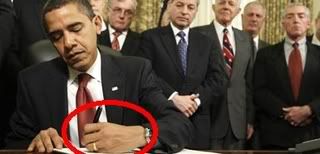Look, it's fantastic that we've got an agreement with North Korea. It never would have happened if John Bolton had his way. (And I thought Feith was the stupidist neocon.)
The Editors explain the agreement in depth, and compare this new agreement with where we were before the Bush Administration scuttled the idea of direct talks, resulting in less diplomacy and more underground nuclear explosions.
Since the word is that we could have made this deal six years ago, why didn't we?
BOLTON: This is in many respects simply a repetition of the agreed framework of 1994. You know, Secretary Powell in 2001 started off the administration by saying he was prepared to pick up where the Clinton administration left off. President Bush changed course and followed a different approach. This is the same thing that the State Department was prepared to do six years ago. If we going to cut this deal now, it's amazing we didn't cut it back then. So I'm hoping that this is not really what's going to happen.Okay John, I'm going to assume that you had a "secret plan" to put North Korea's nuclear genie back in the bottle. That was working so well, wasn't it.
Idiot.
Judge for yourself. I always think a graphic representation helps compare apples to apples, so here is our "new" agreement on the left, compared to applicable clauses in the 1994 agreement on the right. You tell me if the latest "progress" was worth allowing Kim Jong Il becoming a nuclear power -- and if it could have/should have been avoided while Bolton and his neocons played toy soldier on a old Risk board.
SCROLL DOWN (Blogger doesn't seem to like my table)
| 2007 Six-Party Joint Statement -- G.W.Bush Administration | 1994 US-DPRK Agreed Framework -- Clinton Administration |
|---|---|
| 1. The DPRK will shut down and seal for the purpose of eventual abandonment the Yongbyon nuclear facility, including the reprocessing facility and invite back IAEA personnel to conduct all necessary monitoring and verifications as agreed between IAEA and the DPRK. | Both sides will cooperate to replace the DPRK's graphite-moderated reactors and related facilities with light-water reactor (LWR) power plants. Upon receipt of U.S. assurances for the provision of LWR's and for arrangements for interim energy alternatives, the DPRK will freeze its graphite-moderated reactors and related facilities and will eventually dismantle these reactors and related facilities. The freeze on the DPRK's graphite-moderated reactors and related facilities will be fully implemented within one month of the date of this Document. During this one-month period, and throughout the freeze, the International Atomic Energy Agency (IAEA) will be allowed to monitor this freeze, and the DPRK will provide full cooperation to the IAEA for this purpose. |
| 2. The DPRK will discuss with other parties a list of all its nuclear programs as described in the Joint Statement, including plutonium extracted from used fuel rods, that would be abandoned pursuant to the Joint Statement. | The U.S. and the DPRK will cooperate in finding a method to store safely the spent fuel from the 5 MW(e) experimental reactor during the construction of the LWR project, and to dispose of the fuel in a safe manner that does not involve reprocessing in the DPRK. |
| 3. The DPRK and the US will start bilateral talks aimed at resolving pending bilateral issues and moving toward full diplomatic relations. The US will begin the process of removing the designation of the DPRK as a state-sponsor of terrorism and advance the process of terminating the application of the Trading with the Enemy Act with respect to the DPRK. | The two sides will move toward full normalization of political and economic relations.
|
| 4. The DPRK and Japan will start bilateral talks aimed at taking steps to normalize their relations in accordance with the Pyongyang Declaration, on the basis of the settlement of unfortunate past and the outstanding issues of concern. | Both sides will work together to strengthen the international nuclear non-proliferation regime. |
| 5. *** the Parties agreed to cooperate in economic, energy and humanitarian assistance to the DPRK. In this regard, the Parties agreed to the provision of emergency energy assistance to the DPRK in the initial phase. The initial shipment of emergency energy assistance equivalent to 50,000 tons of heavy fuel oil (HFO) will commence within next 60 days. | Alternative energy will be provided in the form of heavy oil for heating and electricity production. Deliveries of heavy oil will begin within three months of the date of this Document and will reach a rate of 500,000 tons annually, in accordance with an agreed schedule of deliveries. |
| The Parties agreed on the establishment of the following Working Groups (WG) in order to carry out the initial actions and for the purpose of full implementation of the Joint Statement: 1. Denuclearization of the Korean Peninsula 2. Normalization of DPRK-US relations 3. Normalization of DPRK-Japan relations 4. Economy and Energy Cooperation 5. Northeast Asia Peace and Security Mechanism | The U.S. will provide formal assurances to the DPRK, against the threat or use of nuclear weapons by the U.S. The DPRK will consistently take steps to implement the North-South Joint Declaration on the Denuclearization of the Korean Peninsula. The DPRK will engage in North-South dialogue, as this Agreed Framework will help create an atmosphere that promotes such dialogue. The DPRK will remain a party to the Treaty on the Non-Proliferation of Nuclear Weapons (NPT) and will allow implementation of its safeguards agreement under the Treaty. As soon as possible after the date of this document U.S. and DPRK experts will hold two sets of experts talks.
|
Nope, not much difference at all. Thank the Flying Spaghetti Monster above that Bush and his League of Fools will be gone before Iran gets the bomb.
Now if you kids are done playing games, could you please clean up your mess.
 Exposing the lack of compassion by conservatives and
debunking right wing hypocrisy at every opportunity.
Exposing the lack of compassion by conservatives and
debunking right wing hypocrisy at every opportunity.





 Subscribe via Email
Subscribe via Email
3 Comments:
Great post, Mark.
PS... Am I on your blogroll? I don't see it... how about a link?:)
A horrible oversite that has now been corrected!
POST A COMMENT